SCERT AP Board 8th Class Social Solutions 14th Lesson Parliament and Central Government Textbook Questions and Answers.
AP State Syllabus 8th Class Social Studies Solutions 14th Lesson Parliament and Central Government
8th Class Social Studies 14th Lesson Parliament and Central Government Textbook Questions and Answers
Improve your learning
Question 1.
Why were the first elections difficult to conduct ? List as many reasons as you can.
Answer:
An Election Commission was set up to conduct the elections in a free and fair manner. Making arrangements for the first elections was a large and complex task. First, a house-to- house survey was carried out to register the eligible voters.
People who contested elections belonged to political parties or were Independents. Election Commission gave a symbol to each of these candidates. These symbols were painted on the ballot boxes in which the votes had to be cast. The voters had to put their ballot paper into the box of the candidate they wanted to vote for. Screens were set up so that the voting (ballot) was secret.
Over 2,24,000 polling booths were set up across the country. Over 25,00,000 steel ballot boxes were made. Nearly 62,00,00,000 ballot papers were printed. About 10 lakh officials supervised the polls. Nearly 17,500 candidates had contested the elections across the coun¬try. Finally, 489 people were elected to the first Lok Sabha. The elections were conducted in a fair, free, impartial and orderly manner, with very little violence.
So we can say that the first elections were a large and complex task.
![]()
Question 2.
Why do you think elections need to be free and fair?
Answer:
The winners in the elections are the writers of our future. So the elections should not be influenced by any issue. They should be free and fair.
Question 3.
For which of the following subjects can laws be made by the Members of Parliament, which by the state assembly, and which can be made by both: agriculture, railways, village hospitals, police, posts and telegraph, electricity, factories?
Answer:
- Agriculture – State
- Railways – Centre
- Village hospitals – State
- Police – State
- Posts and telegraph – Centre
- Electricity – State and Centre both
- Factories – State and Centre both
![]()
Question 4.
Name the two houses of the Parliament. Draw a table to show the similarities/ differences between them on the following aspects: term, number of members, more or less powerful, election process, voting for the President.
Answer:
There are two houses in the Parliament – Lok Sabha and Rajya Sabha.
Similarities / Differences
| Aspect | Lok Sabha | Rajya Sabha |
| 1) Term | 5 years | 6 years |
| 2) No. of members | 545 | 250 |
| 3) More or less powerful | More powerful | Less powerful |
| 4) Election process | Direct | Indirect |
| 5) Voting for the President | All the elected members have the right | All the elected members have the right |
Question 5.
In the 2009 Parliamentary Elections, no single party won a majority. How was the government formed? Discuss with the help of your teacher and write a paragraph.
Answer:
The ‘Like-minded Parties’ who won in the elections formed as a Front ‘UNITED PROGRESSIVE ALLIANCE’. This front formed the government. In this Front INC has a majority.
![]()
Question 6.
Who is responsible for making the laws that are applicable for the entire country?
Answer:
Parliament is responsible for making the laws that are applicable for the entire country.
Question 7.
There are some gaps in the information given in the Table below. Discuss with your teacher to find the missing information and fill in the blanks.
| Position | Who elects | Length of term | Eligibility (min. age, residence, etc) |
| MLA | 5 years | ||
| MP Lok Sabha | Minimum age: 25 years | ||
| MP Rajya Sabha | |||
| Chief Minister | Members of each state majority Party | ||
| Prime Minister | Must be an M.P. | ||
| President | Minimum age: 35 years |
Answer:
| Position | Who elects | Length of term | Eligibility (min. age, residence, etc) |
| MLA | Voters in state | 5 years | 25 years; must be a resident of the state. |
| MP Lok Sabha | Voters in country | 5 years | Minimum age: 25 years, must be a resident of the country. |
| MP Rajya Sabha | MPs, MLAs of all states | 6 years | 30 years; must be a resident of the nation |
| Chief Minister | Members of each state majority Party | 5 years | 25 years; must be a resident of the state. Must be an M.L.A. |
| Prime Minister | Majority of the members in the Lok Sabha | 5 years | 25 years; must be a resident of the nation. Must be an M.P. |
| President | MLAs, MPs of both the houses (Rajya Sabha, Lok Sabha) | 5 years | Minimum age: 35 years, Must be a resident of the nation. |
![]()
Question 8.
Do you think the parties should be made to put up more women candidates for elections? Why?
Answer:
Nowadays women are participated in all activities along with the men equally. They also thinking globally.
Parties should be made to put up more women candidates for elections in order to promote women’s participation in the electoral process. Women, too can express their problems and get them discussed.
A number of countries are exploring measures that may increase women’s participation in government at all levels, from the local to the national.
Question 9.
Following is a study of women’s representation in Parliament houses including that of India and other nations:
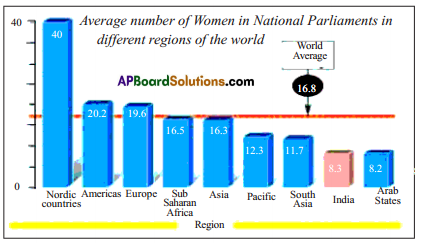 Based on the above information write an essay analysing the following aspects:
Based on the above information write an essay analysing the following aspects:
i) Is there an adequate representation of women in our legislative houses?
ii) How is the idea of representation important to the idea of democracy?
iii) What solution can be achieved for the above? How will you address this issue if you are member of the Parliament? How do you think have certain countries achieved better representation of women in Parliament?
Answer:
i) No.
ii) ‘Democracy’ means people’s government. So the idea of representation is important.
‘People’s means ‘all the nation’, but not only one.
iii) Encouraging women in politics is the only solution for this.
If I were the parliamentarian I support reservations for women in the houses of law and solve this problem. I think certain countries have achieved better representation of women in Parliament in this way.
![]()
Project
When the Parliament is in session, listen to the news on the radio or television or look in the newspapers and make a list of the events that take place. Write a page on any issue discussed in the Parliament, or draw a picture of the scene in Parliament when it is being discussed.
Answer:
The issue is belongs to separation of Telangana state. Separate Telangana state bill was introduced in the Loksabha. There was a long discussions and debates conducted in the Loksabha.
On the basis of petitions of Telangana people the government was decided to separate the Telangana people from A.P State. But in the Parliament majority of members were not accepted. During this time the members of the house joined together and conducted voting among them. And this was introduced in the Rajyasabha also and conducted voting in that house and was the final decision taken about the separate Telangana state.
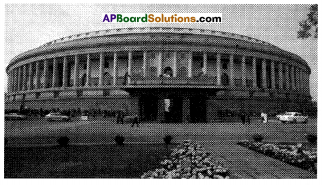
8th Class Social Studies 14th Lesson Parliament and Central Government InText Questions and Answers
![]()
Question 1.
What do you think are the advantages of having a Parliamentary form of government in which the government members are answerable to the Parliament? (Textbook Page No. 162)
Answer:
Advantages:
- It is faster and easier to pass legislation.
- Power is more divided.
- Easy to remove the executive.
- It feels more responsibility.
Question 2.
Should the Parliament only make laws and not control the government in its functioning? Discuss in the class. (Textbook Page No. 162)
Answer:
There should be government control on laws made by government. Otherwise the implementation of it will be questionable. So the condition is framed.
Question 3.
Can you identify the basic difference between Rajya Sabha and Lok Sabha? (Textbook Page No. 162)
Answer:
The basic difference is –
The election for the Lower House or Lok Sabha is direct election.
The election for the Upper House or Rajya Sabha is indirect election.
![]()
Question 4.
Discuss the meaning of the following with your teacher. (Textbook Page No. 166)
- Candidate
- Constituency
- Ballot
- EVM
- Election campaign
- Election Commission
- Voters’ List
- Procedure of voting
- Free and fair elections
Answer:
- Candidate: The person who contests in the election.
- Constituency: States and Union territories are divided into constituencies.
- Ballot: The paper which is used in election for voting. It contains the symbols of the contestants.
- EVM: Electronic Voting Machine.
- Election campaign: The constants request the voters to vote for them. This procedure is called election campaign.
- Election Commission: It is an independent institution which conducts free and fair elections.
- Voters’ list: A list with the names of voters.
- Procedure of voting: The voters give their votes secretly.
- Free and fair elections: The elections in which the voters give their vote without any influence or pressure.
![]()
Question 5.
Discuss with your teachers and parents to learn about how elections are conducted today. (Textbook Page No. 166)
Answer:
At present the elections are conducted peacefully and in a democratic way.
Elections:
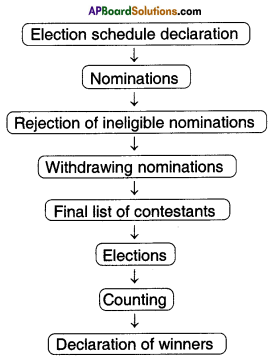
Nowadays, the elections are conducted in a procedure as mentioned above.
![]()
Question 6.
Write down some differences between the first elections and elections held today – ballot box and sheets, age of voting.
Answer:
| Subjects | First Elections | Present Elections |
| 1) Ballot Box | used sealed iron boxes. | using electronic voting machines. |
| 2) Ballot papers | used printed ballot papers. | votes are printed and recorded in EVMs. |
| 3) Age of voting | 21 years | 18 years. |
Question 7.
Recall the laws about which we studied last year. Find out the new laws that are being discussed in state legislative houses and Parliament during their last meeting. (Textbook Page No. 166)
Answer:
- Establishment of women courts,
- If any minor, aged 16 years, is accused in sexual harassment cases, he should be trailed by the criminal court instead of Juvenile courts.
These two bills, are discussed by the Parliament during the last meeting.
Question 8.
Correct the false statements: (Textbook Page No. 166)
- The President and the Vice-President are both elected by the same set of people.
- Every voter in India elects the President.
- All the MLAs of the Vidhan Sabha of Andhra Pradesh participate in the election of the President.
- All the MLAs of all the Vidhan Sabhas and Delhi and Pondicherry and all the MPs of the Rajya Sabha and the Lok Sabha elect the President.
Answer:
- The MLAs of all the states and the members of both houses of the Parliament elect the President. Both the houses of the Parliament elect the Vice-President.
- Every voter, who participated in election, elects the President indirectly.
- Correct statement.
- The MLAs of all Assemblies and the elected members of Lok Sabha and Rajya Sabha elect the President.
![]()
Question 9.
Which of the following is correct about formation of government? (Textbook Page No. 170)
A) Party or coalition that has support of the President forms the government.
B) Party/Coalition with most number of seats forms the government.
C) Party or coalition with more than half the seats forms the government.
D) Election Commission selects the party that will form the government.
E) The person who has won with the largest number of votes in the Lok Sabha election will be the Prime Minister.
Answer:
‘B’ is correct.
Question 10.
Azhar feels that it is better to give more powers to Rajya Sabha because they are mostly wiser people belonging to different political parties.
Mumtazfeels Rajya Sabha should not be given any more powers because they are not directly elected by people. What do you think about their feelings ? (Textbook Page No. 164)
Answer:
I support both the arguments. The thoughts of wiser people are always to be supported. So they should be given more powers. Likewise it is true that they are not elected by the people directly. So we should elect the wise people directly in election.
Question 11.
Can you think why the following illustration has Parliament on one side and people on the other ?
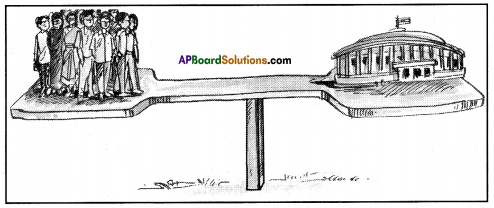 Answer:
Answer:
The population of the country and the number of members of Parliament are in proportionate. If there is no support of the people, the parliament would be weakened. So it is shown like that.
![]()
Question 12.
How many Lok Sabha elections have been held? (Textbook Page No. 167)
Answer:
16 Lok Sabha elections have been held.
Question 13.
A survey showed that among the uneducated and poor, the percentage of people who voted in 1996 was 61 %. However, it was only 53% among graduates. What could be the reasons for this difference? Discuss. (Textbook Page No. 167)
Answer:
The winners in the elections are doing no favour to the people. They are interested in improving their financial balances, assets and developing their personal relations. This may be the feeling of the graduates.
Question 14.
Find out about some important policies and laws made by the Parliament. Make a presentation about it in the class. (Textbook Page No. 161)
Answer:
The important laws made by the Parliament:
1) The Dowry Prohibition Act -1961
2) The Prevention of Terrorist Activities Act – 2002.
Procedure relating to any ordinary bill in the Union Parliament
↓
First reading/introduction stage
↓
Second reading/Discussion stage
↓
Third readingA/oting stage
↓
Bill in the other house
↓
In case deadlock between the two houses – A joint-session of both houses
↓
President approval
↓
Act
![]()
Question 15.
Find out if there are other kinds of government where the government is not answerable to the Parliament or legislature. (Textbook Page No. 162)
Answer:
Monarchial and dictatorial form of governments are not responsible to the Parliament or legislature.
Question 16.
See the map and tables given in Text book P.No. 163 and answer the following questions. (Textbook Page No. 164)
- What is the number of Lok Sabha Constituencies in your state and two neighbouring states?
- Which states have more than 30 Lok Sabha Constituencies?
- Why do so many states have such large number of Constituencies?
- Why are some Constituencies small in area while others are very big?
- Are the Constituencies reserved for the SCs and STs evenly spread all over the entire country or are there more in some areas?
Answer:
- In our state Andhra Pradesh: 25
Telangana: 17
Tamilnadu: 39 - Bihar, Maharashtra, Tamilnadu, Uttar Pradesh and West Bengal.
- The population is high in many states. So the Constituencies are also high.
- Some Constituencies are large and some are small in accordance with the population and extent they have.
- Schedule castes are spread all over the country equally.
Schedule tribes are there more in some areas.
![]()
Question 17.
Who is the Lok Sabha member from your area? Name a few other MPs from your state or neighbouring states. Find out which political parties they belong to. (Textbook Page No. 166)
Answer:
The Lok Sabha member from our area: Kesineni Srinivas (Nani) – TDP.
Names of a few other M.P.s from our state :
- Pusapati Ashok Gajapathi Raju – TDP
- Maganti Venkateswara Rao (Babu) – TDP
- Nirmala Sitharaman – BJP
- Y. Avinash Reddy – YSRCP
Question 18.
Find out the symbols used by different political parties
Answer:
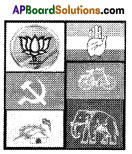
- Congress Party – ‘Hastam’
- BJP – Lotus
- BSP – Elephant
- Communists – Hammer, Sickle/Kanki, Sickle
- TRS – Car
- T.D.P. – Cycle
![]()
Question 19.
Collect the photos of the current ones of the following and paste in the given boxes. (Textbook Page No. 170)
Answer:

Question 20.
Who is the current Prime Minister? Can you name a few earlier Prime Ministers?
Answer:
Our present Prime Minister is Hon’ble Dr. Narendra Modi. (Textbook Page No. 170)
Some of our earlier Prime ministers :
- Dr. Manmohan Singh
- Sri Atal Bihari Vajpai
- Sri Rajiv Gandhi
- Smt. Indira Gandhi
- Sri Lai Bahadur Sastry
- Sri Jawaharlal Nehru
Question 21.
Find out if there are any ministers from your state in the current Central government. (Textbook Page No. 170)
Answer:
Sri P. Ashok Gajapathi Raju – Minister of Civil Aviation.
![]()
Question 22.
Identify few important ministries and government.
Answer:
| Important ministries | Their incharges |
| 1) Defence | Rajnath Singh |
| 2) Agriculture | Narendra Singh Tomar |
| 3) Finance | Nirmala Sitharaman |
| 4) External affairs | Subrahmanyam Jaishankar |
| 5) Home affairs | Amit Shah |
| 6) Communication and Information Technology | Ravi Sankar Prasad |
| 7) Railways | Piyush Goyal |
| 8) Prime Minister | Narendra Modi |
| 9) Women and Child Development | Smriti Zubin Irani |
Question 23.
If you had been living at that time, which side would you have agreed with? Would you have considered it a good idea for India to try to have universal adult franchise and conduct elections? Give reasons. (Textbook Page No. 165)
Answer:
If I had been living at that time, I would have agreed with the optimists. There may be some obstacles to any positive work. We should not deviate from it. So I would have considered it a good idea for India.
Question 24.
Why were the first elections a large and complex task”? (Textbook Page No. 166)
Answer:
Refer answer (1) In Improve your learning.
![]()
Question 25.
Why should the voting be secret? (Textbook Page No. 166)
Answer:
To maintain the self-confidence in the voters, the voting should be secret.
Question 26.
Why do you think it is important to look at the percentage of people who cast their votes? What does it tell us? (Textbook Page No. 167)
Answer:
It shows the confidence of people in elections and also the pattern of voting. So it is important.
Question 27.
Why do you think many eligible voters vote? Discuss the possible reasons. (Textbook Page No. 167)
Answer:
Many of the voters are less interested or uninterested in the election procedure. They feel that whoever may be the winners, the living conditions of the voters remain the same. So many eligible voters did not vote.
Question 28.
What were the opinions expressed by different people at the time of the first elections? (Textbook Page No. 167)
Answer:
Some people said, “The elections are ‘a leap in the dark’, not suitable for a country like India. India is a caste-based society in which many people do not accept the idea that everyone is equal. So it won’t be possible to have a democratic election.”
There were other people who were very hopeful. They said, “Indians have participated in the National Movement to gain freedom from the British. They want to elect a government of their own choice. They want the government to work towards creating a society where every¬one is treated equally. They also want the government to improve the living conditions of the people. Thus everyone should have an equal opportunity to elect a government of their choice.” To such people, the elections were ‘an act of faith’.
![]()